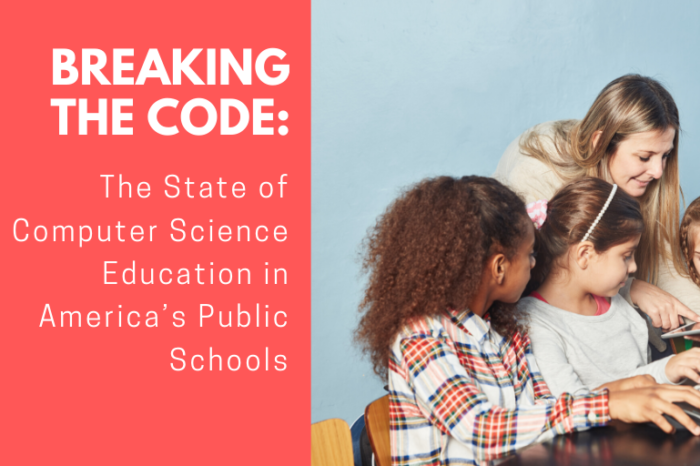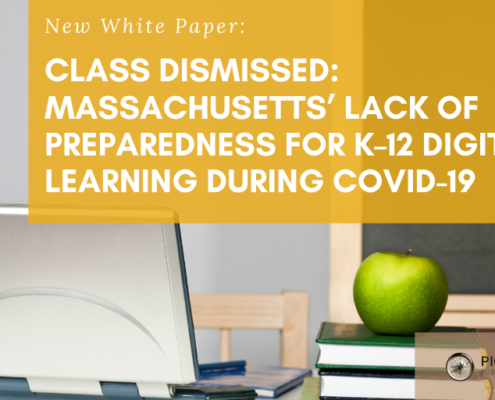Study: Officials Must Address Basic Questions to Improve Public School Computer Science Education
Issues include teacher shortage; certification process; whether subject should be mandatory; and lack of participation among girls, low-income, minority, and urban students
BOSTON – Even as the COVID-19 pandemic has further transitioned education towards electronic devices, computer science education in K-12 public schools around the country faces a number of daunting challenges, according to a new study published by Pioneer Institute. These include insufficient access to computer science classes and clarity about computer science curricula, inadequate teacher preparation, and uneven interest on the part of institutions of higher education.
“Even though computer science is a topic that K-12 policymakers and business groups often claim is a priority, our authors have unearthed a variety of surprising findings,” said Jamie Gass, director of education policy at Pioneer Institute. “Specifically, there is a lack of clarity about how computer science is defined, how teachers are prepared to teach it, as well as the academic background higher education expects for incoming students who want to major in computer science.”
Inadequate Access
Computer science has a surprisingly small footprint in the nation’s public schools. Just 45 percent of public high schools offer it, 34 states have established CS academic standards, and only 26 offer state funding for professional development in the discipline.
Participation in CS is lower in urban and rural public schools than in the suburbs, and low-income students, and students of color are under-represented in the classes.
The subject is more common in Massachusetts, where 85 percent of public high schools offer CS. But only 44 percent of elementary schools do, and less than a third of course offerings are aligned with the Massachusetts Digital Literacy and Computer Science standards.
Lack of Clarity About What Computer Science Is
“Computer science” can mean anything from basic computer literacy skills to fundamental concepts of computing. In 2017, the Computer Science Teacher Association (CSTA) produced CS standards that could provide the foundation for a K-12 curriculum.
That same year, Massachusetts introduced the “Massachusetts Curriculum Framework for Digital Literacy and Computer Science,” which has four strands of core concepts: Computing and Society, Digital Tools and Collaboration, Computing Systems, and Computational Thinking.
Insufficient Teacher Preparation
Schools also face a shortage of qualified computer science teachers. One reason is a certification process that CSTA described as “confused, disparate and sometimes absurd.” Another is that the teachers can earn so much more in the private sector.
There has been progress recently in engaging girls, low-income, and minority students in the field. The AP Computer Science Principles course launched by the College Board in 2016 is a college introductory-level course designed to broaden participation in CS by involving the ideas behind computing such as algorithms, data, and their ethical use instead of programming languages.
This less technical approach is proving to be more welcoming to students. Female participation in AP computer science exams jumped 135 percent between 2016 and 2017. Among under-represented minorities, the increase was 170 percent.
Interest from Institutions of Higher Education
Interviews with officials at both MIT and Worcester Polytechnic Institute revealed that the universities are far more interested in students with strong foundations in math and science than in backgrounds in computer science. Neither school will allow AP computer science credit to substitute for required courses, but the credit may make it possible for students to skip introductory-level electives.
“Most colleges are more interested in students having strong foundations in math and science than a deep background in computer science,” said Ze’ev Wurman, who authored “Breaking the Code: The State of Computer Science Education in America’s Public Schools” with William Donovan. “If computer science were to become a requirement, it would have to replace another traditional academic discipline. It’s a question parents and policymakers should review very carefully.”
Recommendations
Wurman and Donovan urge state education officials to more clearly establish the purpose for CS education, whether it be computer science literacy for all or to provide specialized training for careers in programming or software engineering.
They recommend that states earmark CS teacher training funds and address the scarcity of programs that prepare computer science teachers; and adjust salary scales for teachers in high-demand areas.
Finally, they advocate for more K-8 computer science courses so students aren’t already focused on another course of study by the time they’re introduced to the subject.
VIDEO:
ABOUT THE AUTHORS
William Donovan is a former staff writer with The Providence Journal in Rhode Island where he wrote about business and government. He has taught business journalism in the graduate programs at Boston University and Northeastern University. He received his undergraduate degree from Boston College and his master’s degree in journalism from American University in Washington, D.C.
Ze’ev Wurman is Chief Software Architect with MonolithIC 3D Inc., and has over 30 years of experience in developing algorithms, CAD software, and hardware and software architectures. He has been a senior policy adviser with the Office of Planning, Evaluation and Policy Development at the U.S. Department of Education. He is a Senior Fellow with the American Principles Project and throughout the development of the Common Core standards in 2009-2010, he analyzed the mathematics drafts for Pioneer Institute and for the State of California. In the summer of 2010, he served on the California Academic Content Standards Commission that evaluated the suitability of the Common Core standards for California. He holds over 35 U.S. patents and earned his B.Sc. and M.Sc. degrees in Electrical Engineering from the Technion, Israel Institute of Technology, in Haifa, Israel.
ABOUT PIONEER
Mission
Pioneer Institute develops and communicates dynamic ideas that advance prosperity and a vibrant civic life in Massachusetts and beyond.
Vision
Success for Pioneer is when the citizens of our state and nation prosper and our society thrives because we enjoy world-class options in education, healthcare, transportation and economic opportunity, and when our government is limited, accountable and transparent.
Values
Pioneer believes that America is at its best when our citizenry is well-educated, committed to liberty, personal responsibility, and free enterprise, and both willing and able to test their beliefs based on facts and the free exchange of ideas.
Pioneer Institute is a 501(c)(3) tax-exempt non-profit organization.
Get Updates on Our Education Research
Related Posts











